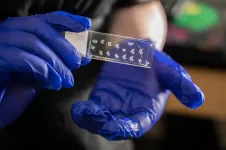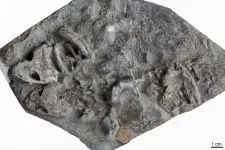Pivotal results from Trinity clinical trial for the chronic condition atopic dermatitis
Trinity College and St James's Hospital Dublin research offers additional treatment option to patients impacted by the chronic inflammatory skin condition.
2021-05-21
(Press-News.org) The findings of a clinical trial by Trinity College Dublin researchers of treatment for atopic dermatitis have been published today in The Lancet journal (Friday, 21st May, 2021). Results of the clinical trial at the School of Medicine, Trinity College and St James's Hospital, Dublin have shown the drug upadacitinib to be the most effective treatment to date for this chronic, relapsing inflammatory condition. The research is vital as there is an unmet need which exists for therapies that provide remission of symptoms in moderate-to-severe atopic dermatitis.
The publication reports efficacy and safety results of upadacitinib compared with placebo for the treatment of moderate-to-severe atopic dermatitis in adults and adolescents. This pivotal Global Phase 3 study involved 1,600 patients and took place over the last two years at The Wellcome Trust/Health Research Board Clinical Research Facility at St James's Hospital.
Atopic dermatitis is a chronic, relapsing inflammatory condition characterised by a cycle of intense itching and scratching leading to cracked, scaly, oozing skin. It affects up to an estimated 10 percent of adults and 25 percent of children. Between 20 and 46 percent of adults with atopic dermatitis have moderate to severe disease. The range of symptoms pose significant physical, psychological and economic burden on individuals impacted by the disease.
Results show upadacitinib to so far be the most effective treatment for atopic dermatitis in clinical trials. The magnitude and breadth of the treatment effect versus placebo across multifaceted aspects of atopic dermatitis provides evidence that a targeted therapy blocking multiple inflammatory pathways could help to address the substantial unmet needs in the treatment of moderate-to-severe atopic dermatitis.
These pivotal findings could potentially transform the treatment goals and standards of care for patients with moderate-to-severe atopic dermatitis.
Professor Alan Irvine, School of Medicine, Trinity College and Principal Investigator said:
"Atopic dermatitis is a common inflammatory skin disease which, when severe, has a very significant impact on quality of life. These results are hugely encouraging and will hopefully offer an additional treatment option for patients very soon. The success of this clinical trial also shows the value of investment in our Trinity research facility at St James's Hospital, meaning Irish patients have access to advanced therapies and Irish medical and nursing trainees gain valuable research skills. "
INFORMATION:
The St James's/Trinity Clinical Research Centre is funded by the Wellcome Trust and the Health Research Board (HRB).
More: Link to the full paper in the The Lancet is available at: https://bit.ly/2QB31es
ELSE PRESS RELEASES FROM THIS DATE:
2021-05-21
An international study led by the ICTA-UAB states that recognizing indigenous peoples' and local communities' rights and agency is critical to addressing the current biodiversity crisis
Policies established by the post-2020 Global Biodiversity Framework of the Convention on Biological Diversity (CBD) could be ineffective if the rights and agency of indigenous peoples and local communities are not recognized and fully incorporated into biodiversity management. This is supported by an international study led by the Institute of Environmental Science and Technology of the Universitat Autònoma de Barcelona (ICTA-UAB) and recently published in the journal Ambio.
The ...
2021-05-21
Scientists at the Ural Federal University (UrFU, Russia) have created clay bricks that are able to attenuate ionizing radiation to a level that is safe for the human body. To the composition of bricks scientists add waste from the industry, which protects against radiation. The article describing the technology was published in the journal Applied Radiation and Isotopes.
"Bricks are a relatively cheap and convenient material with which we can quickly erect protective rooms, structures, walls around objects with radiation," says scientific head of the project, associate professor of the Department of Nuclear Power Plants and Renewable Energy Sources at UrFU Oleg Tashlykov. "The bricks ...
2021-05-21
Chronic skin itching drives more people to the dermatologist than any other condition. In fact, the latest science literature finds that 7% of U.S. adults, and between 10 and 20% of people in developed countries, suffer from dermatitis, a common skin inflammatory condition that causes itching.
"Itch is a significant clinical problem, often caused by underlying medical conditions in the skin, liver, or kidney. Due to our limited understanding of itch mechanisms, we don't have effective treatment for the majority of patients," said Liang Han, an assistant professor in the Georgia Institute of Technology's School of Biological Sciences who is also a researcher in the Parker H. Petit Institute for Bioengineering and Bioscience.
Until ...
2021-05-21
When Charles Darwin published Descent of Man 150 years ago, he launched scientific investigations on human origins and evolution. This week, three leading scientists in different, but related disciplines published "Modern theories of human evolution foreshadowed by Darwin's Descent of Man," in Science, in which they identify three insights from Darwin's opus on human evolution that modern science has reinforced.
"Working together was a challenge because of disciplinary boundaries and different perspectives, but we succeeded," said Sergey Gavrilets, lead author and professor in the Departments of Ecology and Evolutionary Biology and Mathematics at the University of Tennessee, Knoxville.
Their goal with this review summary was to apply the framework ...
2021-05-21
CLEVELAND - Follow-up data from the landmark SPRINT study of the effect of high blood pressure on cardiovascular disease have confirmed that aggressive blood pressure management -- lowering systolic blood pressure to less than 120 mm Hg -- dramatically reduces the risk of heart disease, stroke, and death from these diseases, as well as death from all causes, compared to lowering systolic blood pressure to less than 140 mm Hg. Systolic blood pressure (SBP) is the upper number in the blood pressure measurement, 140/90, for example.
In findings published in the May 20, 2021 issue of the New England Journal of Medicine, investigators presented new evidence of the effectiveness of reducing SBP to a target range of less than 120 ...
2021-05-21
Depressive disorders are among the most frequent illnesses worldwide. The causes are complex and to date only partially understood. The trace element lithium appears to play a role. Using neutrons of the research neutron source at the Technical University of Munich (TUM), a research team has now proved that the distribution of lithium in the brains of depressive people is different from the distribution found in healthy humans.
Lithium is familiar to many of us from rechargeable batteries. Most people ingest lithium on a daily basis in drinking water. International studies have shown that ...
2021-05-21
Beijing, 19 May 2021: the journal Cardiovascular Innovations and Applications (CVIA) has just published a new issue, Volume 5 Issue 4.
This issue brings together important research from leading cardiologists in US and China in a combination of reviews, original research and case reports.
REVIEWS
Pei Huang, Yi Zhang, Yi Tang, Qinghua Fu, Zhaofen Zheng, Xiaoyan Yang and Yingli Yu
Progress in the Study of the Left Atrial Function Index in Cardiovascular Disease:
A Literature Review (https://tinyurl.com/3vruva37)
Nikhil H. Shah, Steven J. Ross, Steve A. Noutong Njapo, Justin Merritt, Andrew Kolarich, Michael Kaufmann, ...
2021-05-21
Social scientists have had a longstanding fixation on moral character, demographic information, and socioeconomic status when it comes to analyzing crime and arrest rates. The measures have become traditional markers used to quantify and predict criminalization, but they leave out a crucial indicator: what's going on in the changing world around their subjects.
An unprecedented longitudinal study, published today in the American Journal of Sociology, looks to make that story more complete and show that when it comes to arrests it can come down to when someone is rather than who someone is, a theory the researchers refer to as the birth lottery of history.
Harvard sociologist Robert J. Sampson and Ph.D. candidate Roland Neil followed arrests in the lives of more than ...
2021-05-21
Paleontologists had to adjust to stay safe during the COVID-19 pandemic. Many had to postpone fossil excavations, temporarily close museums and teach the next generation of fossil hunters virtually instead of in person.
But at least parts of the show could go on during the pandemic -- with some significant changes.
"For paleontologists, going into the field to look for fossils is where data collection begins, but it does not end there," said Christian Sidor, a University of Washington professor of biology and curator of vertebrate paleontology ...
2021-05-21
When one of the largest modern earthquakes struck Japan on March 11, 2011, the nuclear reactors at Fukushima-Daiichi automatically shut down, as designed. The emergency systems, which would have helped maintain the necessary cooling of the core, were destroyed by the subsequent tsunami. Because the reactor could no longer cool itself, the core overheated, resulting in a severe nuclear meltdown, the likes of which haven't been seen since the Chernobyl disaster in 1986.
Since then, reactors have improved exponentially in terms of safety, sustainability and efficiency. Unlike the light-water reactors at Fukushima, which had liquid coolant and uranium ...
LAST 30 PRESS RELEASES:
[Press-News.org] Pivotal results from Trinity clinical trial for the chronic condition atopic dermatitis
Trinity College and St James's Hospital Dublin research offers additional treatment option to patients impacted by the chronic inflammatory skin condition.





